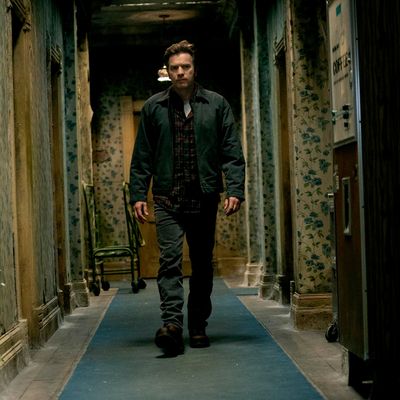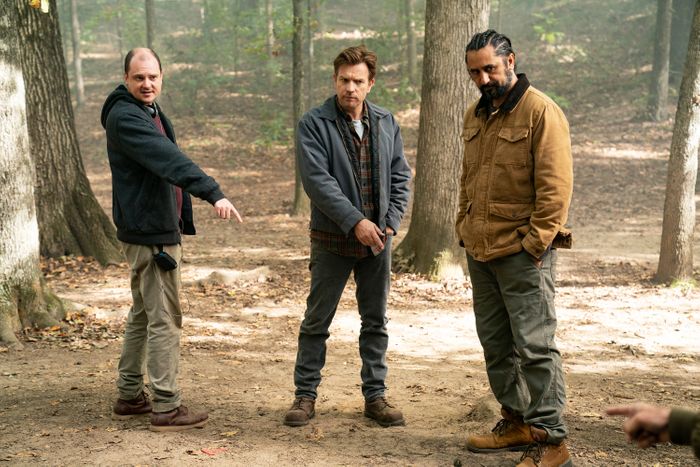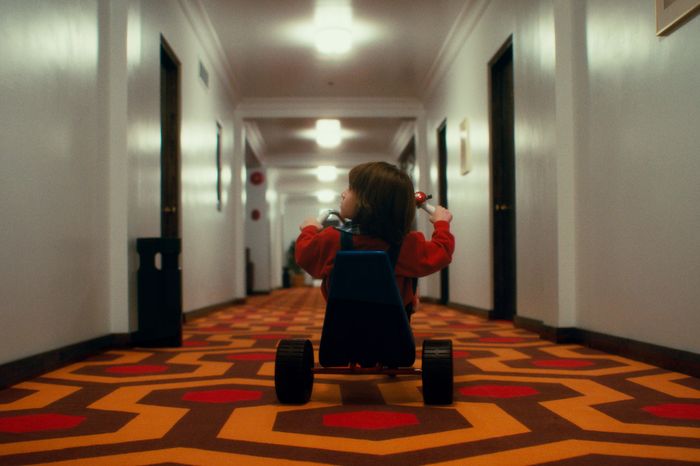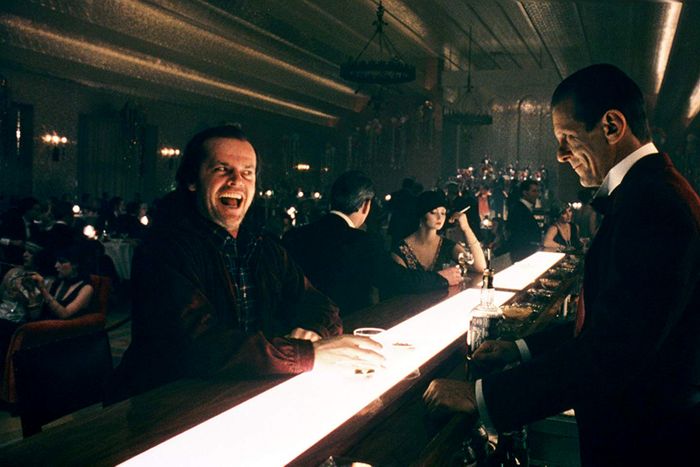
Mike Flanagan juggles a lot of tasks. The writer, director, and producer dabbled in music composition and cinematography early in his career and has edited every feature-length film he’s made. Horror fans know the titles well: There’s Oculus, Hush, Gerald’s Game, Ouija: Origin of Evil, Before I Wake, Absentia, and then there’s The Haunting of Hill House, a breakout Netflix series and perhaps the most mainstream project he’s worked on so far. (He directed and wrote every episode of the show, which was adapted from Shirley Jackson’s novel of the same name.) Hill House introduced a massive audience to Flanagan’s picture-book-charming visual style, his deft handling of family-based character drama, his fascination with the generational effects of trauma, and his ability to imagine one hell of a Terrible Place. For many viewers, it was a long-form introduction to a filmmaker who has quietly become one of the best genre directors of the decade.
All of those elements are coming together again in Flanagan’s second Stephen King adaptation, the Shining sequel, Doctor Sleep. It’s his highest profile theatrical release to date, for which he’s tasked with upholding both the legacy of one of our great American authors as well as the legacy of one of our great American directors, Stanley Kubrick. The film centers on Dan Torrance (Ewan McGregor), who as an alcoholic adult remains traumatized by his experience at the Overlook Hotel. Flanagan is, understandably, “sweating bullets” over the release, given that insurmountable expectations surrounding a property like Sleep could well result in his first poor aggregate critical rating. (As of publishing time, his career “Fresh” score remains in tact.) But if he gets run out of town on a rail, and his movie career evaporates like he has always kind of thought it might, he swears he’s just grateful for the opportunity.
“Sooner or later, I’m not going to be able to say anything anymore. In one way or another, I am going to have nothing left to say in the world,” says Flanagan. “But the weirdest, kind of coolest honor about being able to make movies is that after I’m gone, I can still talk to people. It’s lovely. If I can just plant these tiny little seeds of humanism out there — even if I never see them sprout — that would be great.”
Vulture sat down with horror’s reigning king of putting you in your feelings about why he has taken to doing so many job on set, why he’s drawn to a wholesome aesthetic despite his chosen genre, and what he thinks is the difference between delusion and persistence in the entertainment industry.
I’m not trying to put you on the spot, but if we go off critical reception, you’re basically undefeated at this point. How does that feel, and does it give you any kind of confidence boost taking on a property like Doctor Sleep?
Oh, Jesus. Thank you so much. I mean, that’s just Wile E. Coyote running off the cliff sooner or later, you know? I did think when this started, if any of them are gonna really take one to the chin, Doctor Sleep could definitely be that, just because of the legacy of it all. If it lands then great, but I’m superstitious, and I put way more importance onto the opinions I read on the internet than would be healthy. So, yeah. That freaks me out even talking about it. I don’t feel undefeated.
I’ll admit that I’m only taking into account your feature-film career — and, of course, there are all the years of work it took to reach that point. I was reading an interview around the release of Hill House where you talked about the time in your life when the idea of being gainfully employed as a feature filmmaker seemed like a crazy idea. With a string of successes behind you, have you de-conditioned yourself?
I think I’ve always felt like it could go away at any moment. [Success] kind of appeared so quickly after so much struggle, and the only difference between being tenacious or persistent and being delusional is the outcome, right? So, if this had gone another way, the story would absolutely be, “Oh, yeah. I was delusional,” and no other detail would change. My father is really funny because he’ll say, “You were always so persistent,” and I’m like, “No! The conversations we had along the way when I didn’t have money for rent, were you like, ‘Why don’t you have car insurance?’” Those questions weren’t like, “I admire your persistence!” It was, “You’re crazy!”
Because I’ve been so afraid that it could disappear so quickly, I think I keep working at this crazy pace to try to just hold on to it. For the first time in my life I’m starting to relax. That’s only just now happening, and it’s happening, I think, just because I’m getting older. I have three kids. I made Absentia before my first son was born, so now I look at them and the time that I want to spend at home has increased so much. I’m only now starting to think, Maybe this won’t go away. But if it does, I got to make a pile of movies! That’s pretty great. Maybe it wouldn’t be the end of the world if it stopped.
You wrote and directed Doctor Sleep and you also edited it. Taking on several roles on your projects is pretty normal for you. Does that stem from a control compulsion? Convenience?
I used to be very philosophical about that, but it’s totally a control compulsion I’ve learned. So, for working on [The Haunting of] Bly Manor, I’m not directing every episode.
Which you did do for the preceding season, The Haunting of Hill House.
Yes. That’s been a phenomenal challenge for me and a learning experience of getting me back into a very pure mode of collaboration that’s really lovely. I used to kind of sit up at night and swirl my coffee in my mug and be like, “What is it?” But, no, that was totally a control compulsion. It’s that, if I’m writing it and directing it and cutting it, no one else can like, mess this up. It’s all, for better or worse, going to be on me. I’ll say though, I’m also coming from the perspective of having a family of collaborators in crew and in cast who have been with me now from the beginning. So, this is absolutely a huge tent of very powerful and creative collaborators that I’m so fortunate to work with. But I’ve always had a very difficult time really taking my hands off the wheel, no matter what amount of support I’ve had around. I think it’s anxiety.
Doctor Sleep is pretty lengthy [two hours and 31 minutes], but it’s also a very involved story with a lot of distinct parts. Did doing long form with Hill House inform your feature filmmaking?
Absolutely. I was working on the script for [Doctor Sleep] on set of Hill House, so my mindset at the time really infiltrated this. You know, I read the book and I was like, “This is a five-act story.” From a structural point of view I’d never come across something like that. It was crazy. It was really fun, but I was like, “It’s going to be long. The story is demanding of that …” People think like, Oh, it’s indulgent. It’s like, no, all I want is to make a short movie! I want the most time that I can possibly have to focus on each scene in a given day. The longer the script is, the tighter my days are. You know, I experimented with shorter cuts and longer cuts of the movie, and I felt like this was the one the audiences reacted to the most.
Family trauma is a thread throughout the work you’ve done. In the case of Doctor Sleep, we see the importance of chosen family between “Uncle Dan” and Abra (Kyliegh Curran), and even Rose (Rebecca Ferguson) and the True Knot. You’re also a big King devotee, and I wondered what especially resonates with you about how he writes intimate family relationships.
I think what’s neat about the way he kind of approached [Doctor Sleep] is he built it as a generational story. That made the way I looked at the film change, because Danny is the character with the least amount of agency in The Shining, a story about his parents. King waited decades to come back to that character. He wrote The Shining in the throws of his own anxiety about what alcoholism was gonna do to his family, and he writes Doctor Sleep with decades of sobriety behind him at a point in time when his children are grown and where that danger has passed. He got it under control, and that fascinated me. That made me start to think of this movie less as a sequel than as a descendant.
That really opened things up, because if we’re a descendant of The Shining, then we have two parents. We have Kubrick and we have King, and the DNA of both of them is what makes this movie what it is. But we have to find her own identity. Like any kid, we’re never going to be our parents. I looked at Kubrick and King all my life from the perspective of a child looking up at these monolithic adults, these heroes, and that kind of preserved that perspective for me. So, outside of my own fascination with family structure, and especially with a shattered family, that sense of a generational kind of responsibility also completely seeped into the experience of making the movie.
This conceit of “descendants of” — descendants of people, descendants of trauma — seems fundamental to your body of work.
And that goes all the way back to Oculus. You know, that’s been on my mind forever.
So are your projects a kind of therapy to work through your own life, or are they a study of an observed phenomenon that fascinates you?
I think absolutely both. It’s funny. Sometimes I don’t even realize the personal connection and the relevance to my own family or my own life until after the fact, and it’s like a year or two afterwards I’ll go back and look at something and go, “Oh my God! I know exactly what this is about. I know who this is about.” Hill House was big for me that way. On its face, I knew I was wading through my issues, my family. I was very aware of that. I was far less aware in Oculus and Before I Wake of how much of that was actually way of trying to wrap my head around my own life. So, it’s study and it’s therapy, and I think sometimes the therapy is more successful than other times — just like any therapy.
I’ve only become aware of the repetition of some of these things as other people have pointed them out to me, which has been really fascinating.
Yes, it’s our job to not let you guys move on with your lives and to keep pulling you back into various iterations of who you’ve been.
But that’s fascinating. You know, these movies, they don’t belong to me when I’m done. The things that other people extract from them, they can see the correlations very clearly. I’ve had people say to me, “I saw the difference in the endings of your movies after Kate [Siegel, his wife and frequent collaborator] came into your life,” and it’s like, “Oh, yeah. Wow!” Then I go back and look at it and I’m like, “Yes. Wow. Absentia and Oculus are bleak!” And I don’t see it until you guys see it and point it out.
Something you’ve really built your career on is an attentiveness to your heroines. There’s a care for the interiority of the women in your work and an awareness of the female audience that’s pretty distinct in how consistent it is. This might sound obtuse, but why is that?
I think it’s because I have strong women in my life. They’re way more interesting than I am, and I recognize that right away. I have great role models in that respect. Historically this genre has been hostile and unfortunate in the way it’s approached women … and so initially, when I was younger, it was an active way I thought to try to help the conversation change and make films that could help correct some of that.
I have a daughter now, though, and that changes a lot for me. How she will see women represented in her entertainment, what role models she has, what it can tell her about what’s possible for her in the world, that is a priority of mine.
But you were committed to this well before you became a father of a daughter.
Well, I recognized very early on that the women in my life were all much smarter and more capable than the men in my life. [Laughs.] I love my parents to death. But I was raised by my mother in a scenario where my father was in the Coast Guard and was gone a lot, and so she was my world. It was my mom and it was me and my little brother, and she taught us what it really meant for her to be the central authority figure of our lives, but also the person who led by example, who demonstrated proper behavior and ethics, and who encouraged us both to be creative, to be empathetic, to be fair, and to be compassionate. So, it was kind of a no brainer for me growing up. I was just very fortunate to have that. But yeah, the unfortunate side of the horror genre and how it’s failed its female characters over the years, that’s something I was always aware of.
Visually, your movies remind me of ghost stories from Latin directors, like Devil’s Backbone or Down a Dark Hall. There’s a very storybook quality to them, aesthetically. They’re almost charming looking, which makes the violence feel even more brutal when it comes in — and it very much does in Dr. Sleep. Is that contrast intentional?
It was something that I had rebelled against early on, because so many horror films looked like a horror film. I would see shows and movies sometimes where people go into the ER in a hospital, and it’s lit by, like, the creepy hanging bulb. People are like, doing surgery in here! Like, that’s ridiculous! I was like, “Okay, I get it.” It’s a horror show. But you can’t just pour that like syrup over everything and expect it to be all, “Oh, now everything’s scary!” No. What scares me, and a lot of this goes back to Kubrick, is when the horrific elements intrude on something that’s comforting or something that’s beautiful or something that’s safe. That’s what scares me.
My DP, Mike Fimognari, we’ve been together now for forever. I had met a bunch of DPs who did a lot of horror movies and Michael did dramas, and I was like, “I want that guy!” I want the person who wants beautiful frames, to focus on the dramatic elements and tell the story of these characters, so that when the horror comes in, it’s really not supposed to be there. That, to me, felt cool.
That works extremely well in the scene with [actor’s name redacted to avoid any spoilers] in Doctor Sleep. It really fucked me up.
Yeah. It fucked me up, too. It fucked all of us up from set because [redacted] is just that good. I thought I was being all clever. I thought, “Well, if I’m keeping the frame line here and I’m never going below it, it’s not going to be so bad. People won’t see anything.” And [redacted] made it so much worse, just because [redacted] is so good.
Getting back to the violation of home, the concept of a Terrible Place is essential to horror, and your terrible places are typically so intimately linked to the people inside them. It’s not just plug and play. What is essential to an effective Terrible Place for you?
I think when it comes to spaces, the infiltration of the safety of the home is huge to me. I think that’s because in my home as a kid, that didn’t happen. So that’s an idea that’s very alien to me and very frightening. And that’s something else that goes back to the aesthetic, not only with Fimognari, but with a lot of the production designers I’ve worked with, especially Patrizio Farrell, who did Hill House and is now doing Bly Manor. He always says, “I want to feel at home here. I want to relax into this space so that you can tell me why I shouldn’t.” And it’s like, yes, that’s awesome!
The great and terrible places that pop up in these stories, they’re some of the most fun I get to explore. I had the coolest experience in that I got to walk around in the Overlook Hotel, and what’s amazing about it is for all of the horrible things that happened there, when I walked through it, I couldn’t stop giggling. All of us, we were like delighted children being in that space, because as scared as we were by the Overlook when we were kids, we also learned how to be brave there. We learned how to be brave enough to make it through that scene, brave enough to get to the end of the movie. That’s a profound thing. I think that’s what’s amazing about the genre.





